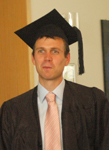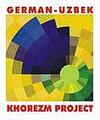Interview with Dr. Gert-Jan Veldwisch

Gert-Jan Veldwisch from the Netherlands did his PhD research at ZEF from September 2004 until December 2007, defending his doctoral thesis in June 2008. His PhD research topic was irrigation water management in Khorezm, Uzbekistan, focusing on its socio-political aspects. He received his PhD degree from the Philosophy Faculty of Bonn University and was supervised by Solvay Gerke, director of ZEF’s Department of Political and Cultural Change, Peter Mollinga, senior researcher at ZEF and Max Spoor, associate professor of Transition Economics at the Institute of Social Studies (ISS), The Hague, the Netherlands.
What do you consider the benefits but also disadvantages of having done your PhD study in the framework of ZEF’s graduate program?
ZEF has a broad perspective on development research and provides room for a variety of PhDs on the interface between various fields. That ZEF explicitly provides room for interdisciplinary PhD research is highly exceptional and a great opportunity. The courses of the ZEF Doctoral Program function as a melting pot of PhD students from many different fields of science. This is an enriching experience, but at it is also time consuming and often not directly useful for the individual PhD research.
What was the main outcome of your PhD research?
I did my PhD research in the framework of ZEF’s Uzbekistan project on “Economic and Ecological Restructuring of Land and Water Use in the Region Khorezm”. My research shows that even though Khorezm is just upstream of the Aral Sea, it is in a situation of water abundance. In the thesis I have described the specific implications this has for water management besides explaining some of the socio-political reasons for creating this water abundance.
Also I have shown that in Khorezm three systems of water distribution co-exist in an intimate relation with each other. These systems are both material and socio-political in nature. The analysis of these systems shows how political control over agricultural production is reflected in water management.
One of the three systems is that of household food production. My research shows that it consumes almost a third of all water use in Khorezm. It is highly productive and the major source of food for the rural population. Meanwhile this form of production has so far received no government support, hardly any attention by foreign aid organisations and has remained outside the view of research. One of my major recommendations is to increase attention and support for this form of production for its high potential of having a development impact.
What kind of position did you take on after graduation?
I started as a post-doctoral fellow at CIAT, based in Mozambique, in February 2008. Most of my current research is on the socio-economic aspects of soil fertility management, technology adoption and adaptation processes, and farmer-market linkages.
In what way do you profit in your current position from your education at ZEF?
I think I’ve learned a lot from working together with scientists from other disciplines. It helps me to understand the issues and concerns of colleagues working from different perspectives on the same issues as I do. I realize it has made me a better communicator, team worker and problem solver.
I’m also happy to be part of the ZEF alumni community – a growing group of bright and potentially influential scientists in various areas of development. Since graduation I’ve already come across other ZEF alumni who I didn’t know before, and I’m sure there will be many such encounters to follow!
Mr. Veldwisch, we thank you for this interview.



